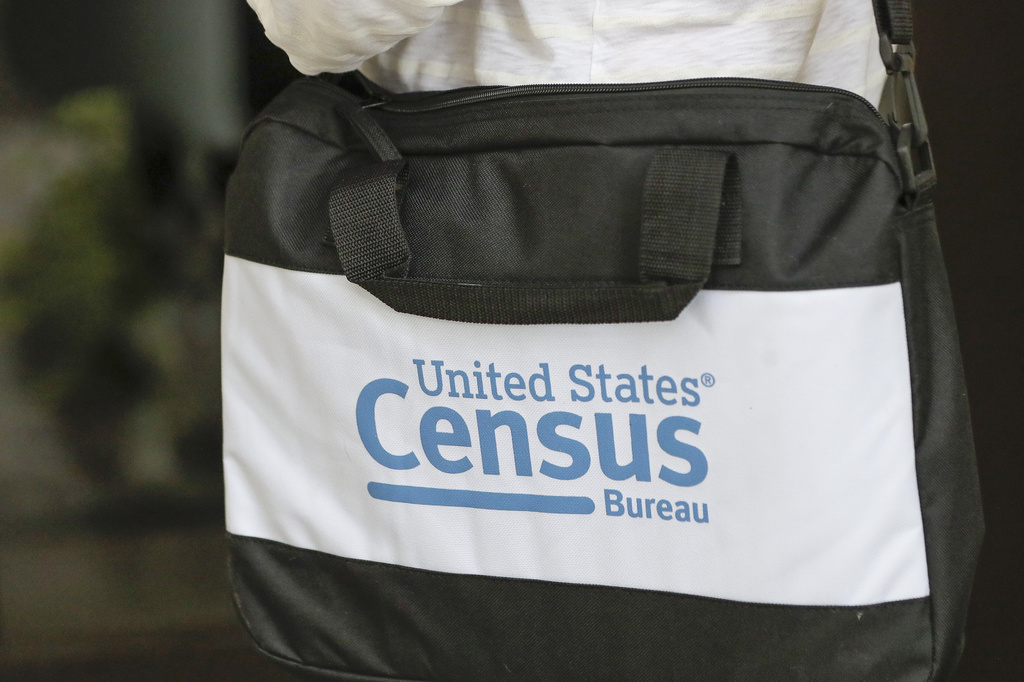Some Republicans in Congress are pushing to require a citizenship question on the questionnaire for the once-a-decade census and exclude people who aren’t citizens from the count that helps determines political power in the United States.
The GOP-led House on Wednesday was expected to vote on the Equal Representation Act which would eliminate noncitizens from the tally gathered during a census and used to decide how many House seats and Electoral College votes each state gets. The bill is unlikely to pass the Democratic-controlled Senate, the White House opposes it and there are legal questions because the Constitution says all people should be counted during the apportionment process.
But the proposal has set off alarms among redistricting experts, civil rights groups and Democratic lawmakers as a reprise of efforts by the Trump administration to place limits that would dramatically alter the dynamics of the census, which plays a foundational role in the distribution of political power and federal funding.
Still, opponents say the idea, once on the ideological fringe, has never gotten so far in the legislative process.
In March, senators rejected similar Republican-sponsored language in an appropriations bill. That push was seen as an effort to bolster the Republican agenda on immigration before the November elections, with Donald Trump as the party’s presumptive nominee against Democratic President Joe Biden.
“It’s taking it closer to reality than it has ever been,” said Steve Jost, a former Census Bureau official in the Obama and Clinton administrations. “This is part of a cohesive strategy in the GOP … of getting every single possible advantage when the country is so closely divided.”
The 14th Amendment requires that congressional seats be distributed among the states “according to their respective numbers, counting the whole number of persons in each State.” Besides helping allocate congressional seats and Electoral College votes, census figures guide the distribution of $2.8 trillion in federal money.
“We ask all kinds of questions on the census anyway so what’s wrong with asking, ‘Are you a citizen?’” Rep. Jim Jordan, R-Ohio, said Wednesday during debate on the House floor.
Similar efforts failed before the last census in 2020 when the Supreme Court blocked the Trump administration from adding a citizenship question to the census form. Following that defeat, the government under Trump tried to discern the citizenship status of every U.S. resident through administrative records and sought to exclude people who were in the U.S. illegally from the count used for apportioning congressional seats.
Biden, in one of his first acts as president in January 2021, signed two orders revoking those Trump directives.
During a House Rules Ccommittee hearing Monday, Rep. Michael Burgess, R-Utah, said including noncitizens in the nation’s head count “skews representation away from American citizens” and is tied to Biden’s “border crisis” because it helps places with large numbers of people who aren’t citizens.
“Localities sympathetic to the president’s agenda are poised to directly benefit,” Burgess said.
According to critics, the citizenship question was inspired by the late Republican redistricting expert Tom Hofeller. He had written that using citizen voting-age population instead of the total population for the purpose of redrawing of congressional and legislative districts could be advantageous to Republicans and non-Hispanic whites.
Republican supporters of the legislation contend counting people who are in the U.S. illegally helps Democrats.
Knowing how many people who aren’t citizens in the U.S. is “the best way to obtain accurate information,” Rep. Andy Biggs, R-Ariz., said at the hearing.
If Trump becomes president, his administration could take steps to add a citizenship question without making the procedural mistakes cited by the Supreme Court in its 2019 ruling, said Jeffrey Wice, a redistricting expert.
“This is really a replay of the fight that Trump started,” Wice said. “They have more time, should he win in November, to avoid the mistakes and go through a much more deliberative census planning process.”
The Biden administration says the GOP bill would increase the cost of conducting the census, make it more difficult to obtain accurate information and violate the 14th Amendment.
Results from a Census Bureau simulation last year indicated a significant number of noncitizens were missed in the 2020 census. Some civil rights groups said that was evidence the Trump administration’s citizenship-question push contributed to an undercount for some racial and ethnic minorities.
“The Constitution is the Constitution,” Rep. Jamie Raskin, D-Md. said during floor debate Wednesday. “The rest of this strikes me as election-year rhetoric.”
(AP)












2 Responses
It is fairly well established law that non-citizens who are residents are counted for apportionment, even though they are not allowed to vote. The textual origin was very clear in saying “persons” rather than “citizens” (leading to the dispute on how to county slaves and the infamous 3/5 rule). The only other exception to the rule on “persons” were Indians since they were considered citizens of their tribe rather than the United States (in the 20th century, they were naturalized as citizens, somewhat against their will).
Tampering with the rule will create tremendous problems. It would benefit states such as New York, California, Florida and Texas in that they would get more seats in the House. However many aliens live in conservative areas so the impact would be muted. Eventually they are their children will become citizens, but it appears that they are hardly hard-core left wingers (remember many are refugees from socialist and anti-religious governments, who came to America to get rich and have freedom of religion, things the Democrats don’t necessarily approve of).
The citizenship question should certainly be on the census. Trump was 100% right about that. It’s a legitimate question, so it should be asked.
But excluding aliens from the count is just crazy talk. Even if the bill were to pass it would have no effect, because the constitution explicitly says the opposite. Even if they passed twenty bills, aliens would still have to be counted. Not just legal aliens, but even illegal ones, and even tourists. The constitution says “all persons”
Akuperma, Indians were not excluded unless they were exempt from taxes. Indians who chose to be civilized and pay taxes were always included. In the early 20th century Congress decided to tax all Indians the same as everyone else, so the category of “Indians not taxed” no longer exists.